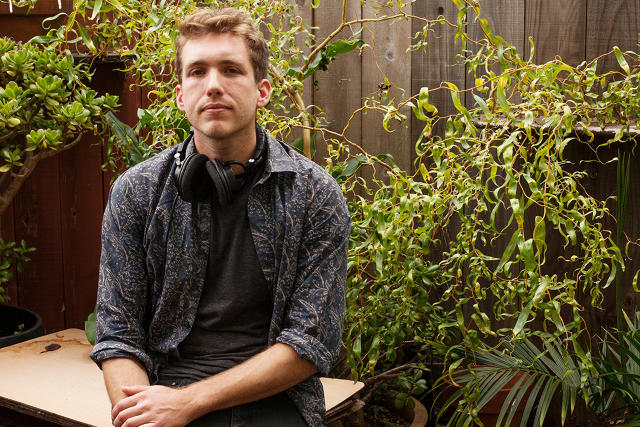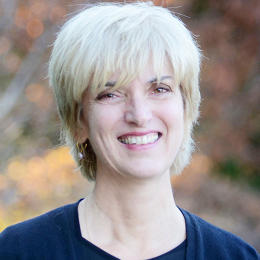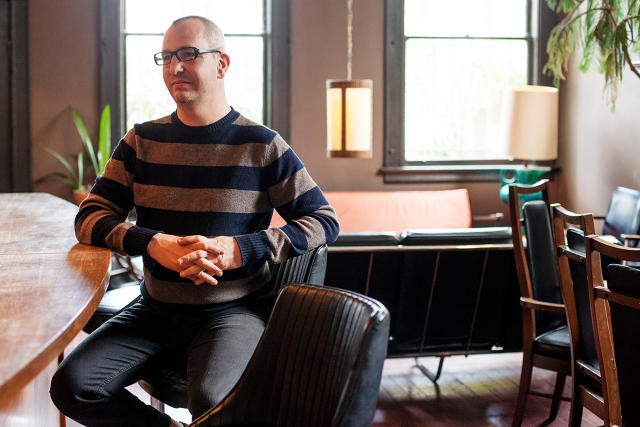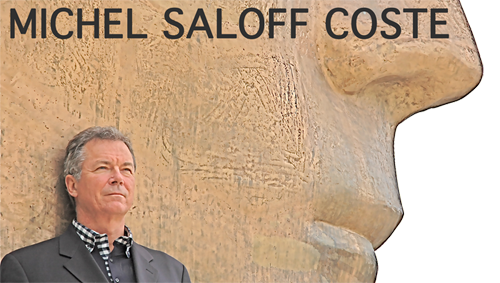THE GENIUSES BEHIND ALL THOSE SAN FRANCISCO STARTUPS? THEY'RE NOT WHO YOU THINK THEY ARE
MEET THREE SURPRISING COMPANY FOUNDERS, TRYING TO CHANGE THEIR LIVES—AND THE WORLD—WHILE HOLDING DOWN DAY JOBS.
San Francisco. It’s gotten that you can’t swing a corporate-logo-splashed swag bag in this town without hitting someone working on a startup.
Since around the time of Facebook’s IPO in 2012, but most intensely following the social media behemoth’s multi-billion-dollar acquisitions of WhatsApp and Oculus VR earlier this year, San Francisco has thrummed—and occasionally shuddered—with startup fever. Everywhere you go, the conversations you overhear are about runways and burn rates; Uber and Lyft drivers unspool elevator pitches at their passengers; and if you’re so inclined, you can eat as many locally sourced mini grilled cheeses and drink small batch spirits for free any night of the week at an ill-advised, lavish launch event for this week’s hot crowdsourced-dry-cleaning-social-curation-dating app.
Just as a generation of starry-eyed wannabe movie stars flocked to Hollywood in the middle of last century hoping to be discovered like Lana Turner at the soda counter of Schwab’s Pharmacy (too bad that was merely an urban legend) and more than a few would-be Master of the Universe muscled their shoulder pads onto Wall Street during the go-go 80s, San Francisco is now the place where ambition, money, and countless ideas have converged.
AngelList, a platform that helps connect founders with investors, features 8,012 companies seeking funding and every day brings more examples of how the city is changing dramatically in the face of the ever expanding tech bubble. The city’s population has exploded, taxing infrastructure and sending real estate prices into the stratosphere. As a result, many longtime residents have left or dug in for a vicious culture war.
And yet, hopeful tech founders continue to flock here, hoping to find the streets paved with gold—or at least seed funding.
The typical image we have of startup workers—the ones who work 20-hour days, live in cramped "tech communes" and bootstrap on ramen as they vie for a coveted spot in an incubator and, they hope, a shot at that sweet-sweet venture capital—is only one version of this story. For some entrepreneurs, startups are sidelines that they work on as they hold down more traditional day jobs. For these founders, the hard work and hustle are added on top of the challenges of their full-time jobs, inspiring them to develop new strategies and workarounds as they balance their lives and their dreams.
Here are three portraits of tech founders with lofty ideas, each coming from decidedly grounded starting points.

The Artist
If Geoff Morris has his way, users of Google Maps will not only be able to see what streets and exotic locales look like, but hear what they sound like as well. Afield, the app he’s developing between freelance contract work for non-profits, lets users create their own field recordings that will be geotagged and stitched into Google Maps so that other users can experience everything from the sounds of trucks backing up, to music spilling out of cars, and the voices of residents. All of this, Morris hopes, will heighten the experience of being there—even when you’re across the world.
Morris graduated from Stanford with a master's in computer science and sound art. Rather than throw himself into a large company like many of his classmates, he found himself drawn to the artier, edgier areas of tech. In addition to Afield and his contract work, he runs an experimental music record label called Bunker Days. So perhaps it’s not all that surprising that he views the current tech boom through the eyes of an artist, rather than a VC.
"Autonomy and creativity are values that I’ve tried to pursue while developing my career," he tells Fast Company. "The incubator system is like signing on with a major label. All of a sudden you have executives and investors who are motivating a lot of your decisions." Without having investors or powerful mentors to answer to, Morris hopes he can focus on making his app actually work and getting it out to the world in 2015.
For now, Morris is developing Afield between other assignments, working on his MacBook in cafes around the Mission District. "This is as lean as it gets, baby," he says with a hint of self-effacement. By keeping his overheard low, Morris can keep himself nimble. "When you work by yourself, there are more opportunities to pivot as they say, and revise your ideas."
Smallness also helps him avoid some of the herd mentality of other startups each trying to be "the Uber of [fill in the blank]" or "Netflix, but for [something or other]."
"A lot of tech workers are trying to win the app lottery," Morris says. "A lot are skimming the fat because it beats working for minimum wage. I think this is a real problem."
Morris has a dim view of many of the startups he’s encountered, considering their products and their approaches to be exploitative or worthless. "The app economy is just another extension of the servant economy," he said. "Another way to hire servants for yourself and be catered to more conveniently. I just feel that that’s a spiritual dead end, motivated by mercantile drive. There’s nothing technologically interesting about it."

The Veteran
What sets Peggy Northrop apart from many other founders is her deep experience in legacy media. The former VP and global editor-in-chief of Reader’s Digest (with stints on the upper masthead at Real Simple, Glamour, Vogue, and others), Northrop caught the startup bug when she relocated to the Bay Area to become editor-in-chief of Sunset Publishing.
"I’m a little different than your average entrepreneur," Northrop says. "I’ve worked at eleven jobs in seventeen years and I don’t think it would be a stretch to call me midlife at this point. I have kids in college and a house and a 401(k). So even if I wanted to live in a garage I couldn’t at this point."
While she’s not working out of a garage, she is going indie with SheBooks, a catalog of short e-books written by and for women that Northrop cofounded with An Italian Affair author Laura Fraser and Rachel Greenfield, a former Executive Vice President in Martha Stewart Omnimedia’s publishing division. They’ve already released 71 fiction and nonfiction titles that sell for $2.99 on Amazon and Barnes & Noble. SheBooks is also working on a print anthology and event series. Early funding for the company arrived through a seed grant by the New Media Women's Entrepreneurial Fund, which is overseen by American University. Money from friends, family, and angel investors helped keep the financial momentum going. And in June, a Kickstarter campaignbrought in nearly $57,000.
Part of what motivated Northrop to take on a startup on top her already heavy day-to-day responsibilities at Sunset is the buzzing energy of San Francisco itself. "All of my media friends in New York are so depressed and I’m in the land of hope," she said. While she’s happy, not to mention very busy, at Sunset (a division of Time, Inc.), Northrop also understands that complacency is not an option in a media landscape where even the biggest brands and most beloved properties can find themselves disrupted and discarded.
"I don’t think there’s a lot of safety," she says. "I think you’re really lucky if you get 20 years in a corporation. In your thirties and forties if you can be in a corporation, it’s a great thing and safe. But when your kids are out of the house you can start your own business. It’s really easy to get into this rote thing. Why change it if it’s not broken?" she asks.
"Well, its always at risk of being broken."
The effort of getting SheBooks off the ground may be additive to Northrop’s day ("I’m doing things now that I haven’t done in 30 years," she admitted), but it’s also taught her new approaches to her day job. "I’m using the startup experience as a way to expose myself to some of the new thinking in our business. There’s always somebody 20 years younger than you coming up with ideas. You either evolve or die."

The One Man Band
Most days Donald Rainwater can be found behind the counter at Sugar Lump, a cozy, dimly lit coffee shop in the Mission District. When not making specialty coffees and dealing with all the responsibilities of being the cafe’s manager, Rainwater works on his side project, Bad Service, a private social network for service industry workers to connect with one another and share stories about their work and lives.
Rainwater has 15 years of experience in the tech industry and decided to do all the design and coding himself, working mostly from an iPad Mini with its camera blacked out by electrical tape. While he’s been involved in several other startups, he’s always kept his job at Sugar Lump.
"Since I’m creating a social network for people in the service industry, it would be very easy for me to quit this job and then essentially become a techie again. But I want to retain my contact with the job itself," he says. "I genuinely love my job and my customers. I don’t want to lose contact with that. No matter how successful I get, I’ll continue to work here to some degree."
This month Rainwater will unveil a Kickstarter campaign to raise funds for his nascent network. He’s aiming for ten thousand members to start. The main thing he’s offering, besides a place for baristas, bartenders, servers, and other service industry workers to meet and commiserate, is a high degree of privacy so that their words don’t come back to haunt them.
"No one who’s not a member can see any of the content on the website," Rainwater said. "I don’t want people to get fired. I don’t want the focus to be on negativity. I want this to be a place where people can get together and essentially talk about [work]."
From his perch at the counter, Rainwater has a unique perspective on San Francisco’s startup madness. "I’m pretty bitter about the whole startup thing," he tells me. "There are people who come through here who have a bad attitude because they’re new to the industry and they think that whatever thing they’re working on is going to be the next Apple Computer or Facebook. It doesn’t really work that way."
"My attitude towards it is more laid back. I don’t think I’ll be the next [Mark] Zuckerberg or Steve Jobs or whatever. It’s interesting and kind of funny to see these people come in. You can see this look in their eyes. Most of these people don’t tip."
He laughed at the thought of it.
"I’ve noticed that people in the tech industry do not tip as well. There’s a degree of entitlement that comes with it. A lot of them don’t think beyond their scopes. They don’t understand people working in the service industry."
That’s where Bad Service comes in, Rainwater hopes. "It’s interesting being in San Francisco and making a startup that’s in reaction to the industry that’s defining this industry."
Someday, there may very well be an app for that.
[Photos: Damien Maloney for Fast Company]

Aucun commentaire:
Enregistrer un commentaire